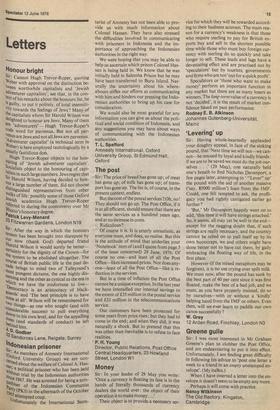Honour bright
Sir: Cannot Hugh Trevor-Roper, quoting Weber with approval on the distinction be
tween worthwhile capitalists and 'Jewish adventurer capitalists', see that, in the con:text of his remarks about the honours list, he is guilty, to put it politeiy, of total insensitivity towards the feelings of Jews ? Many of the capitalists whom Sir Harold Wilson was delighted to honour are Jews. Many of them are 'adventurers' — Hugh Trevor-Roper's code word for parvenus. But not all parvenus are Jews and not all Jews are parvenus. Adventurer capitalist' (a technical term in weber) is here employed tautologically by a Ilsually fastidious don.
Hugh Trevor-Roper objects to the honouring of 'Jewish adventurer capitalists'. Socialists object to the honouring of capitalists in such large numbers. Jews regret that Sir Harold Wilson, having decided to hon,Qur a large number of them, did not choose uistinguished representatives from other vialks of life: possibly some of those Oxford Jewish academics Hugh Trevor-Roper /eferred to during the controversy over Mr nhutto's honorary degree. Patrick Levy-Menard 23 Fitzwarren Gardens, London N19 Sir: After the way in which the honours system has been brought into disrepute by our now (thank God) departed friend Harold Wilson it would surely be better_ certainly for the dignity of the Crown—for the system to be abolished altogether. The course of British public life in the past decade brings to mind two of Talleyrand's nInsl pungent dictums, the one highly dise„ekrning and the other as cynical as the era in nieh we have the misfortune to live&!ettlocracy is an aristocracy of blackguards' and 'The best principle is to have none at all'. Wilson will be remembered for t_wo things—as one who sought (and with edonsiderable success) to pull everything nwn to his own level, and for the appalling nless (and standards of conduct) he left behind him. ‘,.1,;j21. Godber
Sandcross Lane, Reigate, Surrey
Indonesian prisoner , • As members of Amnesty International 'cue 'ford University Group) we are con s rned about the welfare of Colonel A. Hasa Political prisoner who has been held si"nout trial by the Indonesian authorities ,rlce 1967. He was arrested for being a sym"pathiser of the Indonesian Communist iLrtY (PKI) in the aftermath of the October '65 attempted coup. Unfortunately the International Secre
tariat of Amnesty has not been able to provide us with much information about Colonel Hassan. They have also stressed the difficulties involved in communicating with prisoners in Indonesia and the importance of approaching the Indonesian authorities in the right way.
We were hoping that you may be able to help us ascertain which prison Colonel Hassan is being held in. We know that he was initially held in Salemba Prison but he may have been transferred to Buru Island. Naturally the uncertainty about his whereabouts stifles our efforts at communicating with him and hinders our pressing the Indonesian authorities to bring up his case for consideration.
We would also be most grateful for any information you can give us about the political and social condition of Indonesia, and any suggestions you may have about ways of communicating with the Indonesian authorities.
T. L. Spofford Amnesty International, Oxford University Group, St Edmund Hall, Oxford


































 Previous page
Previous page